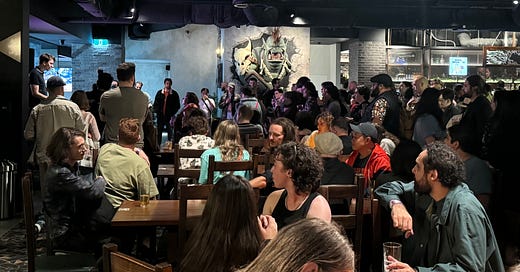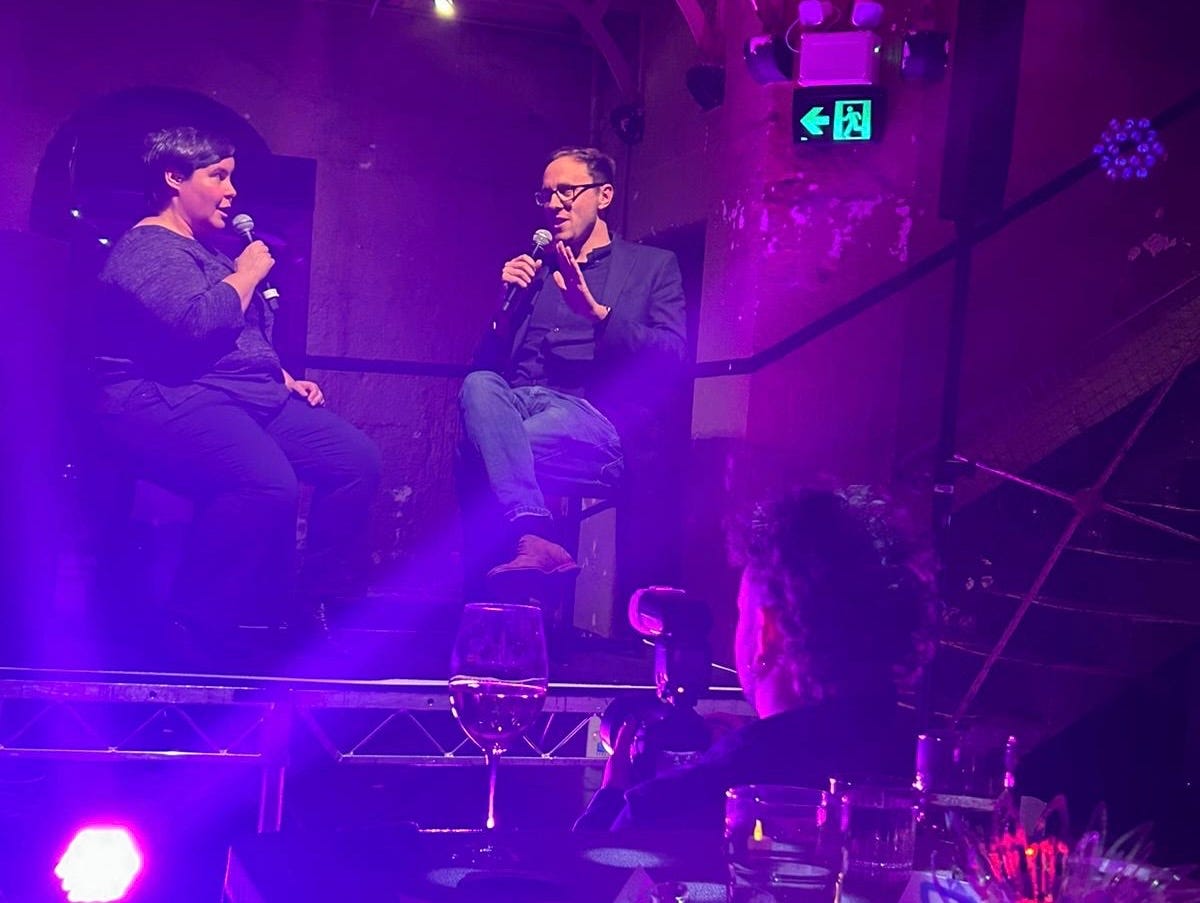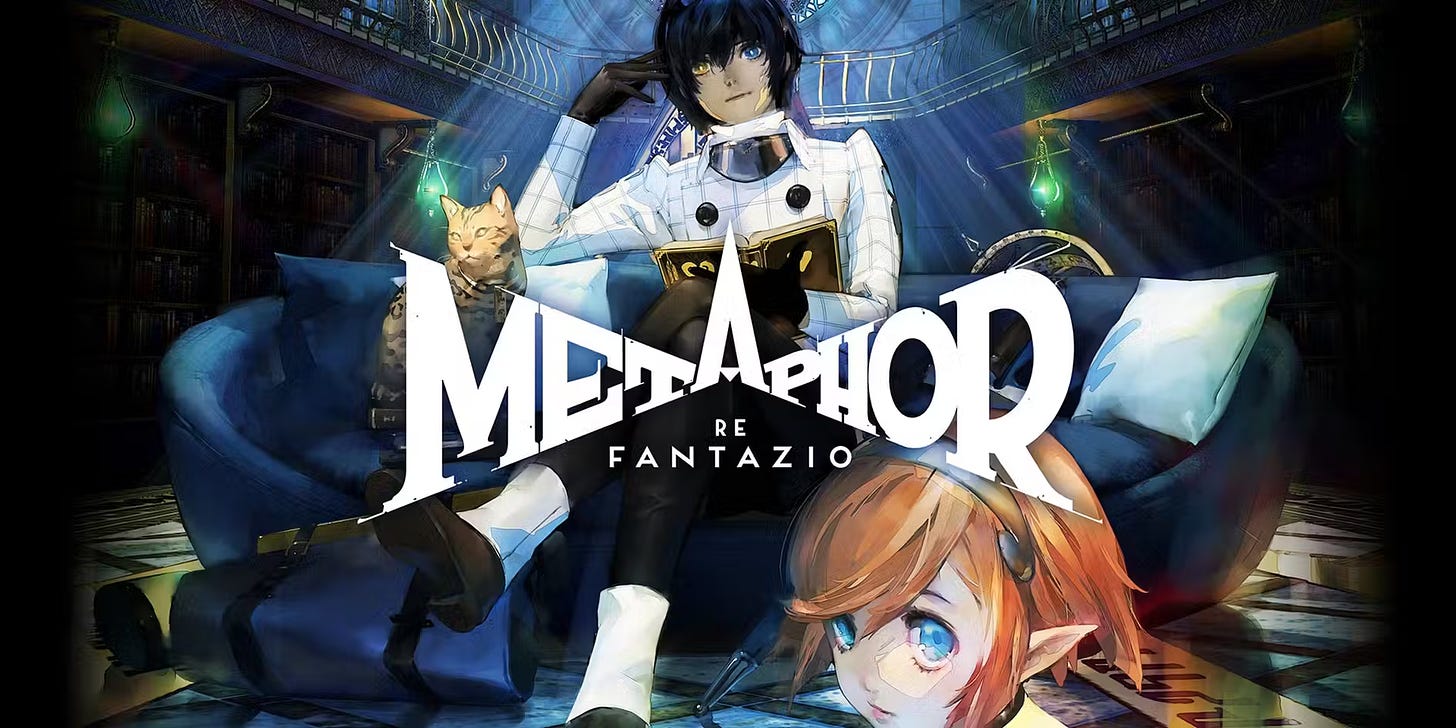Four things I learned at Melbourne International Games Week, 10/10/2024
Including why the city may be the best place in the world to make indie games
I explore the ins-and-outs of Melbourne’s thriving games scene
343 rebrands to Halo Studios in swanky marketing reboot
Metaphor Re:Fantazio leads a week of terribly named video game releases
Hello VGIM-ers,
It’s World Mental Health Day today. So instead of rolling out my usual intro updating you with what I’m up to, I want to encourage you to take five minutes today to ask how a friend, family member or colleague is doing.
Chatting about your mental health is hard and it’s something that I’ve found tough to do for most of my life.
I only really got the hang of it after 2019, when the end of a major relationship encouraged me to talk to an understanding boss, an excellent therapist and my friends about the challenges I was facing.
However, not everyone is lucky enough to have someone to talk to.
Whether it's due to a lack of access to mental health services, the right support network around them or a belief that their struggles aren’t worth hearing, too many people suffer through tough times in silence - making their lives just that bit more miserable in the process.
So rather than put pressure on people who may be struggling to reach out to make the first move, I want you to be like my mate Carl - who does this for me regularly - and take a moment to directly ask someone “how are you doing” before the day is out.
You don’t need to say anything showy. You don’t need to agonise for hours over who you pick. And you don’t need to spend any more time on this than it takes to hammer out a text or give someone a ring.
But if everyone subscribed to this newsletter has just one chat like this today, we’ll give nearly three and a half thousand people across the world a chance to share how they’re doing.
So if you can find time during a coffee break, when you’re putting the bins out or just before you head out of the office this evening, please take five minutes to do so.
You never know what difference such a simple act of kindness could have on someone’s life.
And with that public service announcement done, let’s dive into this week’s newsletter.
The big read - Four things I learned at Melbourne International Games Week
Melbourne International Games Week (MIGW, pronounced Mig-wah) is well and truly underway.
The event, which celebrated its tenth anniversary this week, brings together the Australian video games community and international attendees to hear tip-top conference talks, frantically do business with one another and hang out together in the heart of a truly lovely city.
But what does MIGW tell us about the state of both the local games scene? How has it weathered a tricky year for games across the world? And what comes next for the capital of Australian video games development?
Let’s find out.
1) Is Melbourne the best place in the world to make indie games?
One of the major reasons why I wanted to go to Australia was to find out why the country has generated so many independent development hits over the past decade.
Since 2014, Australian indies have been responsible for games such as *inhales* Crossy Road, Hollow Knight, Untitled Goose Game, Unpacking, The Artful Escape and Cult of the Lamb to name just a few.
But when we hone in on that list a little more closely, it becomes noticeable that four of those originated from Melbourne. And there’s a good reason for it too.
Melbourne, and the wider state of Victoria, has tailored its cluster to support creative indie developers, building an enviable structure within which local developers can create great games and get them to market.
There are a number of reasons why this has happened, the majority of them carefully authored by people within the state.
The Victorian Government has provided effective bespoke support for its local video games sector for the best part of two decades now, moving quickly to support game developers in the wake of the 2008 financial crisis which decimated the majority of Australia’s internationally aligned industry.
This included offering general start up funding for business, dedicated pots of cash for games businesses via the VicScreen agency, skills development programmes to help local developers prepare for business success and supporting wider ecosystem plays - such as MIGW - to prop the sector up.
Next, those infrastructure plays by local Government were supported more widely by supplementary institutions based across the state.
On the cultural side, ACMI, the museum of screen culture which I popped to last week, has proudly supported the creative argument that aligns with what the cluster produces - while also offering space for developers to create games of their own via its accelerator scheme.
And on the skills side, local education institutions such as RMIT University and Collarts have been popping out talented game developers capable of augmenting local teams or growing their own businesses from scratch to keep the pipeline full.
Lastly, the tight-knit nature of the Melbourne game design community has created a remarkable flatness that both connects the sector together and makes it a doddle to learn from the best of the business.
This was evidenced at Games Connect Asia Pacific (GCAP) by the ease with which aspiring developers could literally walk up to the creators of many of the cluster’s hit games to ask them for advice, many of whom were literally sitting on the floor of the conference centre instead of being tucked away in a nearby hotel a la GDC or gamescom.
The result has been the creation of a cluster that has been primed to pump out hit independently developed games capable of reaching global audiences successfully - transforming Melbourne into the home for most of the Australian games industry’s studios (29%) and headcount (41%) in the process.
In my time in the industry, I don’t think there are many other clusters across the world with such a tightly defined sense of its own identity.
And the fact that Melbourne knows it is a great place to make creative indie games means it’ll likely keep up its run of hits in the years to come.
2) Making the next step
Melbourne’s success story is one that is definitely worth celebrating.
But while pretty much everyone I spoke to was proud of what the cluster has evolved into, it was tempered slightly by a fear that it could bump into a natural ceiling on its growth.
Indie and double A game development has driven Victoria’s cluster forward to its dominant position in the local market, handing it cultural power across the world in the process.
But the reality is that most of these games sell effectively enough to sustain the studio making them or to enable moderate growth in their headcount.
In a tough year for the sector, that has given the cluster some much needed resilience against wider market forces.
However, a number of people I spoke to worried that the lack of a major homegrown hero, or sizeable international business, restricts options for talent in the market and - by extension - opportunities to grow bigger businesses.
While Victoria’s games scene is great for creative developers with top notch ideas for games, the lack of a big fish in the pond makes it harder for juniors to get a first job, encourages ambitious talent to move abroad and deprives business founders who don’t produce a hit of a safety net for them to land in.
And while Melbourne’s tight focus may be a strength for now, it also risks the development of a monoculture in the local sector - something that could prove ‘brittle’ in the words of one attendee in the long term.
However, I think there are two reasons why this concern might be overplayed.
The first is, simply, that generating a whopping business is hard to do. Paul Callaghan at VicScreen rightly pointed out that industry giants emerge from a mixture of titanic personal ambition, massive financial backing and often a lot of luck. Supporting the growth of ambition amongst local games businesses is a controllable goal. Creating a giant isn’t.
So it makes sense to build the conditions in which one can emerge, rather than hook the cluster’s strategy around achieving such an outcome at all costs.
Second, and interrelated to the point above, there do seem to be enough businesses in the local scene who could be well set to expand to fulfil that need organically if they get their slice of luck.
Hipster Whale, under the stewardship of Clara Reeves, have grown from an hilariously understaffed team servicing its hit game Crossy Road into a tightly defined business with a head count of 30.
Playside Studios, the creators of viral hit Dumb Ways to Die and the recently released Kill Knight, has expanded its headcount significantly across four locations in Australia and New Zealand - working on its own games and external development projects to maintain its pathway to growth.
And the presence of international giants in Melbourne such as Sledgehammer, a key cog in the Call of Duty machine, speak to the fact that diversification of business type is already happening - reducing the risk of the monoculture emerging.
I can certainly understand why there are fears that the local cluster could hit a ceiling without broadening out.
But equally, it feels like the conditions are right for something to bloom; it may just require a little bit of luck before that standout superstar emerges.
3) Insulation nation
While Victoria is clearly pondering what comes next for its cluster, it (along with Australia more generally) has managed to skirt much of the mayhem that’s enveloped the international industry.
In a talk at GCAP earlier this week, Colin MacDonald of Games Jobs Live revealed that open roles in the Australian games industry had declined by 50% year-in-year.
This, obviously, isn’t great. But when you consider that the number of open roles in the UK video games industry - a considerably larger sector that should be less susceptible to large percentage swings in its market figures - declined by over two-thirds in the same period, it’s clear that the local market has at least been partly sheltered from the worst of the global crisis.
Speaking to people in Melbourne, there seemed to be two major explanations for why this is the case.
First, the long shadow of the global financial crisis encouraged developers within the state to build businesses capable of withstanding a downturn.
If the downside of creating lots of indie or double A businesses is a potential cap on ambition, the upside is that many of Melbourne’s companies were much more sustainable than internationally funded competitors - insulating them against challenges in the global landscape.
Second, financial support for the industry from state and federal governments appears to have buffered it from the worst of the crisis.
Locally, the aforementioned grants and incentives from VicScreen gave developers consistent sources of funding to lean into.
But the recent introduction of the country’s Digital Games Tax Offset - essentially a 30% relief on projects valued at over half a million Aussie dollars - also played into the industry’s hands surprisingly well, with the first rebates from the scheme being paid out in the past few months.
This isn’t to underplay the impact of the past year on individuals and businesses within the sector.
A number of businesses in the local cluster with ties to international finance were clobbered by lay-offs. EA’s Firemonkeys Studio cut two thirds of its headcount after a number of its projects were handed off to developers elsewhere, while legendary local studio League of Geeks announced an indefinite hiatus after its latest release underperformed.
And more generally, people on the show floor at GCAP told me that access to finance within the territory outside of state incentives has been even harder this year - with investors and publishers putting less cash into fewer projects and doing so much more slowly.
Nevertheless, I couldn’t help but feel that Melbourne had avoided the worst of the bloodbath that I’ve witnessed in London and the UK.
And while it is also aiming to ‘survive to ‘25’ like the rest of us, there is a sense that developers in Victoria are comparatively well placed to push their prospects forward both next year and beyond.
4) Keeping ahead of friendly rivals
Finally, Victoria’s lead within the Australian games industry is widely accepted and acknowledged across the country.
During the course of the conference, one source from another state described Victoria’s lead over the rest of Australia as “embarrassing” while another laughed and said that developers in the region were “spoiled” by the quality of support.
However, it seems as if a fight is beginning to warm up across Australia amongst states seeking to strengthen their own video games clusters in response to the success story.
How this manifested itself differed from chat to chat. Screen Queensland was celebrating both the announcement of $1.3m of funding for nine indie games, while also talking up the creation of 600 games jobs in the state since 2022.
Another body, who were less publicly talkative, made it clear that their grumbling about a lack of local support was increasingly being heard by officials who fear they may be missing a trick.
But despite the fact that each state was clearly seeking to jostle with one another for business, the rivalry was also somewhat artificial.
As one screen representative noted to me, the Australian sector at large faces too many common challenges - access to international finance, securing enough senior talent, supporting the local talent pipeline, overcoming its overall isolation - to put states into deep competition with one another.
So instead, the industry seems to be moving towards an approach whereby it advocates clearly as one Australian voice but uses the distinctive pitch of each state - such as a more creative environment to make games or a better corporate business environment - to funnel local talent and international partners towards a relevant landing zone.
Whether every state will contribute to such a vision or not is questionable. It seems as if Victoria and Queensland will continue to lead the way in the territory, even with closer cooperation.
But it does point to a concerted effort by states to knit together their efforts to support the games industry. And that can only be beneficial for developers in Melbourne and across the rest of the country in the years to come.
The best of the rest of MIGW
I have to start the best of the rest with an acknowledgement of the power of recognising history as it actually happened. Every event at MIGW began with an acknowledgment of country, in which a host - or representative of the country’s First Nation community - would note that the activity we were participating in was being conducted on land that was unceded by the Wurundjeri Woi-wurrung and Bunurong Boon Wurrung people. Each pronouncement was brief, but it was a quietly powerful way to assert that the history of the land we all stand on stretches well beyond the foundation of Melbourne in 1835.
The deep sense of community within Victoria’s games scene was underlined by the breadth of events organised across the week. While I had to miss the full delights of PAX and Parallels to fly to Sydney (I need a long weekend), the opening night party on Sunday was packed and the celebratory Big Night Out in Federation Square on Thursday evening - which featured the premiere of a game called Blaktasia from indigenous studio GUCK - showcased both the width of the local games community and it’s tight knit nature.
I saw one of the best games I have ever seen in a game pitching competition last week. The winner of the Tertiary Hackathon, a contest which saw college and university teams create games with social purpose, was The New Paper; a game designed by a team from The Australian College of the Arts that put you in the shoes of a newspaper editor via a Papers, Please style interface. Very well designed, very well pitched and a very clever way to teach media literacy.
As part of the Education Symposium, a two day event which sought to link together industry and education prior to MIGW, I was interviewed by Rad Yeo for an episode of ABC’s Big Ideas podcast. I’ll be scribbling some of the answers that I gave during the interview for VGIM Insiders tomorrow, before sharing the podcast with you all when it eventually drops. But for those of you wanting to hire a host for a games event in Australia (or internationally, for that matter) make sure to hit Rad up - she was superb.
The Australian Game Developer Awards took place during MIGW. The winner of game of the year was Conscript, a top down survival horror game set in World War I created by one man band Jordan Mochi. Other notable winners included Chaos Theory Games, who won Studio of the Year, while Chloe Appleby and Ben Armstrong were both recognised as Rising Stars.
All of the rumours about Melbourne being a delightfully liveable place proved to be true. The city is easy to navigate, the coffee is great and the food is consistently fantastic. Just remember to pack clothes suitable for all seasons if you come in Spring because the city really wants you to experience them all in the course of 24 hours.
And finally, I was interviewed for five minutes at MIGW’s Ministerial Dinner at Melbourne’s Old Gaol on Tuesday. May Jasper, the host of the chit-chat, asked me before I went on stage if any questions were off limits. I said no. So she kicked things off by asking me whether I thought Hinge was the best dating app. Bluff well and truly called, May.
My trip to Melbourne was funded by the team at Creative Victoria. Thank you to Fran, Karen, Alida, Alia and the rest of the team for making this research trip possible and for supporting my attendance of all events across MIGW.
News in brief
Halo Effect: 343 Industries has been rebranded to Halo Studios following a shake-up at the Seattle based company. The business, which was founded to take over the development of the classic FPS from Bungie way back in 2007, is also shifting development of the game to Unreal Engine - ideal for creating thirst trap-esque promo art like the screenshot above. Phwoar etc.
Roboshed: Hindenburg Research, an activist short-selling company, has gone in hard on Roblox, accusing it of inflating its daily active user numbers and failing to protect its users by reducing its spend on trust and safety. Some say that “all PR is good PR.” Given that the report describes Roblox service as “a paedophile hellscape for kids”, I’d be inclined to disagree.
Donato mess with this guy: A US judge has issued a permanent injunction against Google that will force it to show users alternative stores. The ruling from Judge James Donato, which is the latest development in the long running legal battle between the company and Epic Games, will also see the company forbidden from paying companies to launch apps exclusively or first on Google Pay, pay companies not to compete with Google Play or require app makers to use its billing service. Further details on how this will work are due within the fortnight (ha!)
PIFing about: Saudi Arabia’s Public Investment Fund is considering upping its stake in a number of Japanese games companies, according to its vice chairman Prince Faisal bin Bandar bin Sultan Al-Saud. The lengthily named royal said that there’s a “possibility” that it could expand its share in companies such as Nintendo, Koei Tecmo and Capcom in an interview to Kyodo Games in the fringes of Tokyo Game Show - exactly the kind of place you’d expect to see a member of the house of Saud, you’ll agree.
Ubisold?: Ubisoft is reportedly in line to be taken private by the Guillemot family and Tencent, according to a recent report in Bloomberg. The company did little to dampen reports, responding to speculation of a buy out by saying it “regularly reviews all of its strategic options” in the same way that I tell friends that I’m only “reviewing” the dessert menu at a restaurant.
Discordant: And finally, as a rare bonus news story, Russia and Turkey have both banned Discord in the space of a week. Vicki Blake has written a good summary of what’s happened and the immediate impact it has had on Turkish game developers over on GI Biz.
Moving on
Tom Hegarty is the new Chair of Ukie, replacing Tim Woodley after an excellent stint at the top of the UK industry table…Lucy James (no, not that one) is the new Content & Online Safety Compliance Lead over at Epic Games…Chris Friar has been appointed as a Director, Game Publishing at Tencent Games…Brandon Dean has joined PlayStack as its Marketing Manager…Rachel Kowert has been appointed as a Strategic Advisor, Policy at Discord (picked a hell of a week for it, eh?)…And Amazon has snapped up J Allard, the co-founder of Xbox, as VP of Product in its Devices and Services team…
Jobs ahoy
Discord is hiring for a Director of Business Development, Gaming (presumably one who doesn’t enjoy spending time in Istanbul)…There’s another banging job going in Rockstar in the marcomms team, with the GTA loving funsters looking for an International Community Manager…Jagex has an unannounced game and they want YOU (or someone with relevantly qualified) to become its Producer…Sony Interactive Entertainment wants a machine learning expert to join its team in London as a Program Manager…And for those of you reading from Victoria today, why not consider the tantalising role of Art Director at Tantalus Media?...
Events and conferences
SXSW Sydney, erm…Sydney - 14th-20th October
AI and Games Conference, London - 8th November (SOLD OUT)
PG Connects, Jordan - 9th-10th November
G-Star 2024, Busan - 13th-17th November
Slush, Helsinki - 20th-21st November
Games of the week
Metaphor Re:Fantazio - Terribly named fantasy RPG from the minds behind the Persona series launches on PC, Xbox and PlayStation
Diablo IV: Vessel of Hatred - Terribly named Diablo DLC drops this week, also on the same platforms.
Starship Troopers: Extermination - Terribly named Helldivers rip off (note: this is a joke) arrives on, yep, you guessed it: all the platforms that the other releases this week came out on.
Before you go…
What’s better than playing Age of Empires 2? Playing Age of Empires 2 in first person, of course.
PC Gamer’s Richard Stanton has written up his thoughts on Overreign, a mod to the classic strategy game that allows you to enjoy its skirmish mode from an entirely new perspective.








Melbourne local here. Welcome! Hope you had a good week here. You got a good week of weather too, which is a bonus.
You accurately captured the rivalry between States. They are now all to some extent supporting the games industry with grants. The biggest challenge is that actually getting those grants takes a lot of time for developers. But it’s better than nothing, and no system is perfect.
I’m guessing you were flown down for the event? We need to do more to promote our local ecosystem globally, and getting you here is likely part of that!
I've been to Melbourne once. Good beer, nice museums. Turns out it's become a game development hub as well.